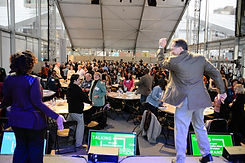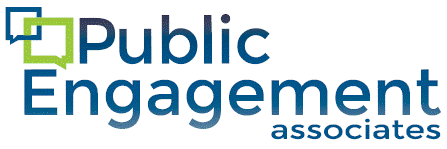



MULTISTAKEHOLDER DIALOGUES
On Complex Public Policy Issues
Beyond its core work of engaging communities in partnership with public sector leaders on various public policy issues, Public Engagement Associates has also helped organize and facilitate several high-profile multistakeholder dialogues (MSD) over the years.
What is a multistakeholder dialogue?
It is a process for developing a shared understanding of a complex policy issue, establishing a common platform among different stakeholders through dialogue, discussion, and debate, and starting joint action planning.
3 Types of Focus
Multistakeholder dialogues differ in structure and outcomes.
This diagram shows the three types of focus that we see for MSD projects:
-
Problem-focused: how do we solve this issue together?
-
Opportunity-focused: let’s create something new of value for all of us.
-
Conflict-focused: how do we move forward out of this impasse?

Derived from The MSP Guide: How to Design and Facilitate Multistakeholder Partnerships, p. 16.
Multistakeholder projects also differ in size, duration, and content, but they share key characteristics:
They are valuable when issues require many stakeholders to collaborate on a solution.
They bring together various stakeholders with diverse agendas but who share some common interests.
They help generate a comprehensive analysis of a specific issue and develop new insights and strategies that help improve ownership and agreement on recommended actions.
How It Works
How does PEA work with you to ensure a multistakeholder dialogue process?
A PEA facilitator will work with your team from the conceptualization of the dialogue you’re looking to convene through to the follow-up and report writing.
We work with you to ensure you have clear goals, purpose, and outcomes for the multistakeholder dialogue process.
Next, we collaborate to organize and facilitate an MSD steering committee to plan and deliver the dialogue.
After that, we work with you to establish the right scale and scope for the deliberations and in selecting the “right” stakeholders to take part.
During the planning process, we ensure you understand how the dialogue’s results will be used and who will receive and act on the recommendations.
As we get closer to the dialogue, whether a multi-day event or a regular/weekly convening, we prepare staff and committee members for their roles in the convening(s).
During the dialogues, we facilitate the overall dialogue process in the convening(s) and ensure that small and large groups have effective discussions while properly capturing and recording all parts of the dialogue.
Finally, we lead the full group to finalize a shared agreement in all key areas of the deliberation and then review the dialogues in depth to ensure we produce and distribute timely reports to all participants.
Contact us to get a free phone consultation and to learn more about multistakeholder dialogues. We'd love to hear from you!
Past Projects
PEA has been leading multistakeholder dialogues for more than 20 years, led by by one of its co-founders, Steve Brigham. These projects have included:
-
A global, 3-day biodiversity summit in Brussels with 250 people from 27 countries to develop a framework for a positive vision for biodiversity that the Belgian Biodiversity Platform has used for ten years.
-
A series of 15 multi-day, national summits over sixteen years with the American Association of Community Colleges that engaged hundreds of community college stakeholders on topics ranging from technological education to undergraduate research and from K-12-higher education partnerships to competencies for sector leaders.
-
Two, 2-day national summits (separated by one year) to convene an ideologically diverse group of more than 150 activists and advocates to develop practical strategies to protect U.S. democracy against the increased risk of authoritarian government.
-
Two, 1-day convenings with Beth Israel Deaconess Medical Center that brought together transplant patients, medical doctors, and other healthcare professionals to improve patient voice and visibility in the organ transplant candidacy selection process.
-
A citywide summit with 400 youth and adults in DC, followed by a four-month multistakeholder action planning process with young people, District of Columbia agencies, service providers, nonprofits, and mental health advocates to complete a set of policy recommendations and policy initiatives, securing $1.6 million to implement the agenda.
-
A 6-month process in Montgomery County, Maryland, to facilitate a wide range of county agencies, state representatives, state agencies, utility companies, real estate development companies, and community members to develop an ambitious set of recommendations (22 of which were endorsed unanimously) for every element of the county’s development review process.
-
Facilitation for the D.C. Bar Foundation over seven months with six D.C.-based legal nonprofits with more than a dozen legal staff to create a streamlined process for residents to access civil legal counsel on housing tenant and eviction issues in the D.C. court system.
-
Facilitation of an anti-bullying task force for eight months that included advocates, local service providers, school administrators, parents, school mental health professionals, teachers, students, and District agency leaders to create a comprehensive, citywide anti-bullying model policy, endorsed by the Mayor.



